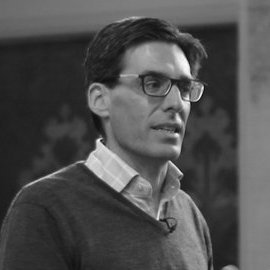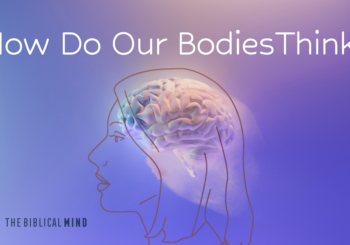Part of the Embodying Biblical Rituals in a Digital Age series
Digital Deceleration and the Ritual of Sabbath
I wonder if you’ve had the experience of pausing for a moment in your day and finding yourself suddenly overcome with a sense of boredom. It might happen while you’re waiting at the grocery store checkout. Maybe it’s when you sit down in your chair after a long day at work. Or maybe it’s on a walk through the park or somewhere outdoors when your mind wanders, but suddenly you feel the need to captivate your attention with something else. How do you respond?
Enjoying this article? Read more from The Biblical Mind.
Do you take a deep breath, empty your lungs, and feel the sound of your heartbeat reminding you that you’re alive? Do you look around and attune yourself to the sights, sounds, or smells of the world? Or, like so many of us, do you reach for your phone or some other device to turn away from the world and from your own thoughts only to plunge yourself into digital distractions that alleviate the boredom? Though many of us may find comfort in our digital devices, there is a cost we pay personally and communally when we lose our ability to rest, to slow down, and to cease from our activity in the world. This is why the practice of the biblical sabbath is so critical for our modern society. Sabbath brings us back to a place of rest in God’s holy time and helps us detach ourselves from the distractions of our culture and our digital devices.
Digital Distraction in an Accelerated Society
One of the reasons we’re so driven to distraction by the technology we use is that we live in an accelerated society. The modern world is ever pushing forward and driving us toward more and more consumption. Whether that’s consumption of material things or consumption of digital media—the world never stops tearing us away from the practice of lingering, meditating, and even, dare I say, experiencing a sense of boredom.
Sociologist Hartmut Rosa argues about the accelerated world we inhabit, “A society is modern when it operates in a mode of dynamic stabilization, i.e., when it systematically requires growth, innovation and acceleration for its structural reproduction and in order to maintain its socio-economic and institutional status quo.”1Hartmut Rosa, “Dynamic Stabilization, the Triple A. Approach to the Good Life, and the Resonance Conception,” Questions De Communication (Nancy) 31 (2017): 437–56 (439). See also his more detailed argument in Social Acceleration: A New Theory of Modernity, translated by Jonathan Trejo-Mathys (New York: Columbia University Press, 2013). Our culture, therefore, requires growth to remain stable, which means that there is a constant push for things that are faster, more productive, and more technologically advanced. These aren’t necessarily bad things, but when they become the driving force of our daily lives, we can find ourselves getting swept along for the ride. Often we don’t even realize that we’re complicitly accepting the values of our culture.
Let’s take a couple of examples. If technology, consumption, and speed are of the highest priority, then corporations will press us to purchase the newest, fastest, most technologically advanced things whether we need them or not. We don’t need to go too far back in history to discover cultural norms that found value in an object because of its longevity. If you had a hammer, a knife, or a tool that you wanted to pass on to future generations, then you valued the craftsmanship and care with which the item was made. In today’s world, however, we find a fundamentally different mindset. Value is found in what is new and, consequently, what is old is thrown away. We have become a disposable society that has little comprehension of how our waste is affecting the world around us. And so we inadvertently inherit the values of the culture that stand in contrast to a Christian ethic that preserves, cherishes, and values what God has made.
Let’s take one more example. In an accelerated, modern culture, speed affects not only our transportation and production but also our communication. The digital world has brought the benefits of communicating with people around the globe at a moment’s notice, but this is often at the expense of our local communities and sense of being rooted where we are. Two people might be at a café together, but if they’re engrossed in their screens, they lose their ability to be present and the attentiveness required to truly listen to each other.
The same is true of many families you might see out to eat. There’s silence around the table because the children (and parents!) are glued to their digital devices. The modern culture has been stripped, and often deprives itself, of critical moments of communion eating and drinking around the table because the pace of life and the immediacy of our digital communication draws us away from one another as if we’re getting swept down a rushing river. The devices that were meant to give us more time and keep us connected end up making us feel like we have less time and are more disconnected than ever.
Establishing Rituals of Deceleration
So how do we decelerate in our increasingly accelerated culture? How do we establish rituals and patterns in our lives that cultivate attentiveness, rest, communion with others, and a sense of our physical presence as we are rooted in the places where we live?2For more on healthy rituals see, Dru Johnson, Human Rites (Grand Rapids, MI: Eerdmans, 2019).
We don’t have to turn far in the pages of the Bible to find the answer. In the first chapters of Genesis, God blesses and sanctifies the seventh day after six days of creation. Resting on the seventh day is not simply an addition to creation, but it’s the culmination of God’s creative imagination and work that brought to life the entire universe! The great medieval Jewish commentator Rashi writes, “After the six days of creation, what was still missing from the universe? Menuchah (“rest”). The Sabbath came, the menuchah came, and the universe was complete.”3Rosenbaum, Silbermann, Solomen Ben Isaac, Rosenbaum, Morris, and Silbermann, A. M. O.T. Pentateuch. Polyglot (London: Shapiro, Valentine &, 1946). Commentary on Genesis 2:2. Sabbath rest completes creation and sets in motion the only pattern that can sustain all creation and bring it to its fullest glory.44. See Mark Scarlata, Sabbath Rest: The Beauty of God’s Rhythm for a Digital Age (SCM Press: London, 2019).
This pattern appears again in the Exodus narrative as God invites his people to experience his rest. After four hundred years of slavery, the Israelites are freed from their bondage, and as they wandered in the wilderness God provided them with manna, or bread from heaven (Exodus 16). He commanded the people to gather the manna for six days, but on the seventh day they were to rest and not gather anything. Even in the Sinai wilderness, God tells his people that it’s critical to stop, rest, and be present with family and friends before the journey begins again. For six days they must bear the work of traveling through the desert, but on the seventh day they are to cease and reflect on the holiness of God and the beauty of his world.
Abraham Joshua Heschel writes, “The meaning of the Sabbath is to celebrate time rather than space. Six days a week we live under the tyranny of things of space; on the Sabbath we try to become attuned to holiness in time. It is a day on which we are called upon to share in what is eternal in time. To turn from the results of creation to the mystery of creation; from the world of creation to the creation of the world.”5A. J., Heschel, The Sabbath: Its Meaning for Modern Man (New York: Farrar, Straus, and Giroux, 1951), 10. Even in the wilderness, before God gave the Law (Torah) through Moses, he was teaching them how critical it is to rest and to enter into the time he had consecrated from the beginning.
When the Israelites reach Mount Sinai, God gives Moses the sabbath command (the fourth of the Ten Commandments), which tells us that we are not only to rest from work on the seventh day, but we’re also to make sure that our families, our animals, land, and the alien among us rest as well (Exodus 20:8–11). It was always a temptation throughout the Old Testament for Israel to work or make money on the sabbath day (see Amos 8:4–6). This often led to the abuse of their workers or animals, stripping the land, and destroying the social fabric of their communities.
The Discipline and Gift of Sabbath
Yet the commandment teaches that sabbath is not simply about having a day of “me-time” but, rather, it’s rest for the health of our families, our communities, and the land. Sabbath was never meant to be just a day off from work. Instead, it’s about entering into a day of sacred time—a time where we begin to experience the eternality of God’s rest and refreshment, which extends to the complex meshwork of our human relationships and our relationship to the land. This was a challenge for ancient Israel and it remains a challenge for us in our consumer world.
Philosopher Byung-Chul Han reflects on the challenges of practicing sabbath rest in our culture and writes, “In order to escape routine, to escape emptiness, we consume ever more new things, new stimuli and experiences. It is precisely the feeling of emptiness which spurs communication and consumption. . . . Rituals bring forth a community in which resonances occur, one that is capable of accord, of a common rhythm.”6Byung-Chul Han, The Disappearance of Ritual: A Topology of the Present, translated by Daniel Steuer (Cambridge: Polity Press, 2020), 10. Practicing sabbath helps us enter into a rhythm with our families and in our faith communities that helps us break from the unhealthy patterns of the world. This common rhythm of entering into God’s holy time allows us to see how the world might be shaping us negatively and how to break from those influences.
To experience the rest that God desires for his whole creation is to be able to stop, to cease, and to offer our deepest attention through a weekly ritual of celebrating holy time. It’s a practice that stands against the narcissism of social media that is constantly reflecting the self to the world, and it stands against the incessant immediacy of doing everything now.7See Walter Brueggemann, Sabbath as Resistance: Saying No to the Culture of Now (Louisville, KY: Westminster John Knox Press, 2014). Sabbath turns us away from speeding blindly ahead and, instead, turns us towards God, our family, and our neighbor. Sabbath also helps us look toward creation and even the heavens beyond our reach as we reflect on the beauty of God and his presence within the cosmos. Being present in sacred time connects us to the things that matter most in this life.
The practice of sabbath today is imperative and, for most of us, it should be a day that is completely disconnected from our digital devices. We should seek face-to-face communication, reconnecting with creation, and having experiences that bring about our mental and physical rest. Sabbath is a time to celebrate the gift of rest with friends and family without distraction from our work or from social media. Sabbath can also incorporate times of silence and meditation, especially if this is not part of our daily routine. The things that consume us in our six-day week in the world should be set aside so that we might re-attune ourselves, reorient our lives, and participate in consecrated time that draws us nearer to God, nearer to one another, and nearer to creation.
The gift of sabbath rest is not one that God forces on his people but, rather, he invites us to experience the eternality of his presence and the fullness of who we are meant to be as human beings. Jesus would have celebrated the sabbath day every week of his life, and he invited his disciples to do the same. For centuries Christians have celebrated the sabbath on the “Lord’s Day,” or Sunday, the day of resurrection. It was appropriate because through the death and resurrection of Christ, the fullness of sabbath rest was breaking into the world. The author of Hebrews encourages followers of Jesus to experience that same sabbath rest through the risen Christ. “So then, a sabbath rest still remains for the people of God; for those who enter God’s rest also cease from their labors as God did from his. Let us therefore make every effort to enter that rest, so that no one may fall through such disobedience as theirs” (Heb 4:9–11).
In an accelerated society bent on speed, technological innovation, and consumption, the Christian response is to decelerate, to cease, and to enter into the rest that God has prepared for all humanity since the beginning of creation. Establishing sabbath rituals takes time and effort, especially when we are constantly being pulled away by digital distractions. Yet sabbath is the perfect antidote to a culture that can so easily consume us and keep us from experiencing God’s rest and refreshment. Sabbath gives us a taste of the promised eternal rest so that we might begin to inhabit the places where we are in the fullness of who we were created to be.
End Notes
1. Hartmut Rosa, “Dynamic Stabilization, the Triple A. Approach to the Good Life, and the Resonance Conception,” Questions De Communication (Nancy) 31 (2017): 437–56 (439). See also his more detailed argument in Social Acceleration: A New Theory of Modernity, translated by Jonathan Trejo-Mathys (New York: Columbia University Press, 2013).
2. For more on healthy rituals see, Dru Johnson, Human Rites (Grand Rapids, MI: Eerdmans, 2019).
3. Rosenbaum, Silbermann, Solomen Ben Isaac, Rosenbaum, Morris, and Silbermann, A. M. O.T. Pentateuch. Polyglot (London: Shapiro, Valentine &, 1946). Commentary on Genesis 2:2.
4. See Mark Scarlata, Sabbath Rest: The Beauty of God’s Rhythm for a Digital Age (SCM Press: London, 2019).
5. A. J., Heschel, The Sabbath: Its Meaning for Modern Man (New York: Farrar, Straus, and Giroux, 1951), 10.
6. Byung-Chul Han, The Disappearance of Ritual: A Topology of the Present, translated by Daniel Steuer (Cambridge: Polity Press, 2020), 10.
7. See Walter Brueggemann, Sabbath as Resistance: Saying No to the Culture of Now (Louisville, KY: Westminster John Knox Press, 2014).
Image created by Rubner Durais
Did you enjoy this article? Check out The Biblical Mind podcast.





